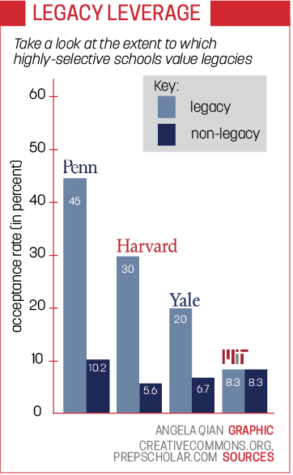For senior Tori Ledezma, the decision to apply early action to Purdue University was an easy one. After all, her parents went there, and Ledezma said that was a large factor for her.
In mid-February, Ledezma officially committed to Purdue University. Ledezma said her final decision to commit to Purdue was heavily influenced by her family.
Ledezma said, “My parents influenced me because they both went there, making me feel more comfortable with the campus and were willing to help pay for my education when they knew it was going to be less expensive.”
 According to the Pew Research Center, many colleges have a higher acceptance rate if applicants have a family member that have attended the university. Throughout the college admission process this is often referred to as a legacy admission. Many Ivy League schools and other top private schools take legacy status into account when assessing applications. Schools consider legacy status for a number of reasons. Families with multiple students or alumni might be more likely to make a donation. Additionally, legacy students who are accepted are more likely to commit to that school. This incrementally increases the number of admitted students who accept offers. This means more acceptance letters come March 31.
According to the Pew Research Center, many colleges have a higher acceptance rate if applicants have a family member that have attended the university. Throughout the college admission process this is often referred to as a legacy admission. Many Ivy League schools and other top private schools take legacy status into account when assessing applications. Schools consider legacy status for a number of reasons. Families with multiple students or alumni might be more likely to make a donation. Additionally, legacy students who are accepted are more likely to commit to that school. This incrementally increases the number of admitted students who accept offers. This means more acceptance letters come March 31.
March 31 and April 1 are the official dates that regular decision applications are announced for many colleges. With the influx of acceptance letters, the college decision process can be quite overwhelming. Melinda Stephan, college and career counselor, said that students should take the time to research and find a school that would be the best fit for them. Resources, including Naviance, allow students to help make this process easier. Naviance serves to inform students about colleges of interest. A few of its features allow students to analyze statistics that help familiarize students with the academic rigor for each school. This helps students narrow down schools that would be a good fit for them academically.
 Family influence is one of the many factors in a student’s college decision process. Other factors that play a role in the college decision process include: cost, size, college major in mind and distance from home.
Family influence is one of the many factors in a student’s college decision process. Other factors that play a role in the college decision process include: cost, size, college major in mind and distance from home.
“Often it comes down to a ‘gut feeling’ about whether a student can see themselves living and learning on a particular campus,” Stephan said via email. “The best way to figure that out is to visit colleges early and often if possible. There is nothing that replaces physically experiencing a campus environment first-hand.”
College visits allow visitors to take campus tours to learn about the college or university’s facilities, as well as student life, culture on campus, academics and programs offered by the school.
“I decided on Purdue because I knew it was a very prestigious school for my field of study as opposed to my other top choice.” Ledezma said the factors that were most important for her in the college decision process.
Sophomore Hope Brewer, who does not want to attend the same college as her parents, said that she wants to attend a school that will be best for the field of study she would want to pursue.
Brewer said, “Neither o
f the schools that my p

arents went to have the major I am interested in doing and are not in Indiana.”
For many students, like Brewer, the distance of the college from home is another major factor that plays a role in the college decision process.
The difference between in-state tuition and out-of-state tuition can vary drastically and is often one of the biggest factors that limit where students may attend college. Stephan addressed the importance of considering the costs of college admissions at the beginning of the college decision process.

“Cost is an important factor in college decision making that often helps students narrow their options, but it often gets pushed to the side until students are making final decisions,” she said. “Paying for college should be something that students and their parents should be talking about from the beginning and throughout the process.”
Ultimately there is not one process through which a student makes a college decision. Each student often has a unique reason that a school is a good fit for them.
Stephan said, “There are a lot of factors that go into making a college decision. Family can be a significant influence, but if students focus on finding a good ‘fit’ they can’t go wrong.”
















































































![Review: “The Immortal Soul Salvage Yard:” A criminally underrated poetry collection [MUSE]](https://hilite.org/wp-content/uploads/2025/03/71cju6TvqmL._AC_UF10001000_QL80_.jpg)
![Review: "Dog Man" is Unapologetically Chaotic [MUSE]](https://hilite.org/wp-content/uploads/2025/03/dogman-1200x700.jpg)
![Review: "Ne Zha 2": The WeChat family reunion I didn’t know I needed [MUSE]](https://hilite.org/wp-content/uploads/2025/03/unnamed-4.png)
![Review in Print: Maripaz Villar brings a delightfully unique style to the world of WEBTOON [MUSE]](https://hilite.org/wp-content/uploads/2023/12/maripazcover-1200x960.jpg)
![Review: “The Sword of Kaigen” is a masterpiece [MUSE]](https://hilite.org/wp-content/uploads/2023/11/Screenshot-2023-11-26-201051.png)
![Review: Gateron Oil Kings, great linear switches, okay price [MUSE]](https://hilite.org/wp-content/uploads/2023/11/Screenshot-2023-11-26-200553.png)
![Review: “A Haunting in Venice” is a significant improvement from other Agatha Christie adaptations [MUSE]](https://hilite.org/wp-content/uploads/2023/11/e7ee2938a6d422669771bce6d8088521.jpg)
![Review: A Thanksgiving story from elementary school, still just as interesting [MUSE]](https://hilite.org/wp-content/uploads/2023/11/Screenshot-2023-11-26-195514-987x1200.png)
![Review: "When I Fly Towards You", cute, uplifting youth drama [MUSE]](https://hilite.org/wp-content/uploads/2023/09/When-I-Fly-Towards-You-Chinese-drama.png)
![Postcards from Muse: Hawaii Travel Diary [MUSE]](https://hilite.org/wp-content/uploads/2023/09/My-project-1-1200x1200.jpg)
![Review: "Ladybug & Cat Noir: The Movie," departure from original show [MUSE]](https://hilite.org/wp-content/uploads/2023/09/Ladybug__Cat_Noir_-_The_Movie_poster.jpg)
![Review in Print: "Hidden Love" is the cute, uplifting drama everyone needs [MUSE]](https://hilite.org/wp-content/uploads/2023/09/hiddenlovecover-e1693597208225-1030x1200.png)
![Review in Print: "Heartstopper" is the heartwarming queer romance we all need [MUSE]](https://hilite.org/wp-content/uploads/2023/08/museheartstoppercover-1200x654.png)




